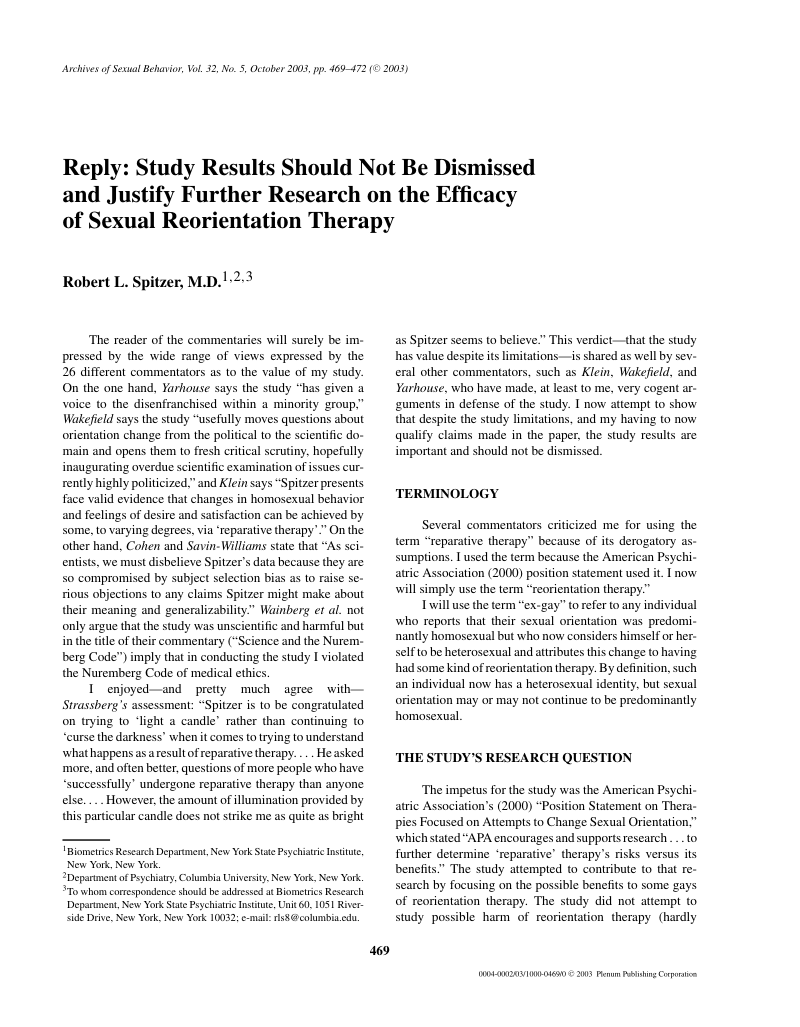Robert L. Spitzer publishes a response to criticisms of his 2003 report on people that reported that their sexual orientation had changed.
- Type
- Academic / Technical Report
- Hearsay
- Direct
- Reference
Robert Spitzer, "Reply: Study Results Should Not Be Dismissed and Justify Further Research on the Efficacy of Sexual Reorientation Therapy," Archives of Sexual Behavior 32, no. 5 (October 2003): 469–472
- Scribe/Publisher
- Archives of Sexual Behavior
- Audience
- Reading Public
- Transcription
Reply: Study Results Should Not Be Dismissed and Justify Further Research on the Efficacy of Sexual Reorientation Therapy
Robert L. Spitzer, M.D.1,2,3
The reader of the commentaries will surely be im- pressed by the wide range of views expressed by the 26 different commentators as to the value of my study. On the one hand, Yarhouse says the study “has given a voice to the disenfranchised within a minority group,” Wakefield says the study “usefully moves questions about orientation change from the political to the scientific do- main and opens them to fresh critical scrutiny, hopefully inaugurating overdue scientific examination of issues cur- rently highly politicized,” and Klein says “Spitzer presents face valid evidence that changes in homosexual behavior and feelings of desire and satisfaction can be achieved by some, to varying degrees, via ‘reparative therapy’.” On the other hand, Cohen and Savin-Williams state that “As sci- entists, we must disbelieve Spitzer’s data because they are so compromised by subject selection bias as to raise se- rious objections to any claims Spitzer might make about their meaning and generalizability.” Wainberg et al. not only argue that the study was unscientific and harmful but in the title of their commentary (“Science and the Nurem- berg Code”) imply that in conducting the study I violated the Nuremberg Code of medical ethics.
. . .
In the paper, I wrote “The study provides evidence that change in sexual orientation following some form of reparative therapy does occur in some gay men and lesbians.” With the benefit of time and the many thoughtful commentaries on my study, a more accurate assessment is the following: The conventional wisdom in the mental health profession is that reorientation therapy can get some gays to identify themselves as “heterosexual” and therefore “ex-gay,” but few, if any, will report changes in sexual attraction, fantasy, and desire consistent with true changes in sexual orientation. The study findings call this view into question. In a sample of 200 ex-gays, the majority reported changes in sexual attraction, fantasy, and desire that are consistent with what would be expected if true changes from predominantly homosexual to predominantly heterosexual orientation had occurred. Although some response bias could have occurred, it is unlikely that it can explain all of the reported changes in sexual orientation.
The study provides the level of evidence appropriate to the initial stages of therapeutic evaluation with regard to an important and controversial issue. What is needed is a prospective outcome study in which a consecutive series of volunteer subjects are evaluated before starting reorientation therapy and after several years. Given the cost and complexity of such a study and the current view in the mental health professions of the benefits and risks of reorientation therapy, such a study is not going to happen in the near future. This is unfortunate because of the real questions raised, albeit admittedly not resolved, by this study.
- Citations in Mormonr Qnas
The B. H. Roberts Foundation is not owned by, operated by, or affiliated with the Church of Jesus Christ of Latter-day Saints.

